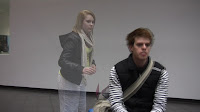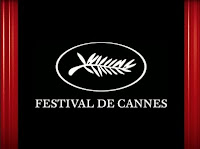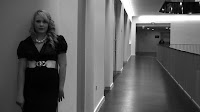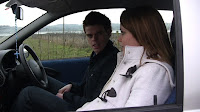The effect mentioned in the film noir feedback
Tuesday, 18 May 2010
Monday, 17 May 2010
The film 'The dead letter drop'
Sunday, 16 May 2010
Coursework Evaluation
 er character makes it seem as if she isn’t real.
er character makes it seem as if she isn’t real.(see the specific effect on the blog entry)
The film made was more of a challenge towards previous noirs in the sense that the locations used and the clothes worn were more of a take on modern noirs (apart from the opening scene) such as brick than those seen in the Big Sleep which was directed in 1946 by Howard Hawkes and the Maltese falcon, directed in 1941 by John Huston, like trilby hats and long silk gown dresses, though in some sense it could also be classed as a development on from the usual narratives that are usually used with film noirs such as those that evolve around the females being considered more powerful then the males.
 e viewer perception it looks like an ordinary public place. It was chosen to use as our meeting place between the two characters with the sound used to be digetic to make this known and secondly we travelled further outwards towards a symbolic bridge within Ipswich. This was to not only play homage to the films British roots but also was a great location as it was down a dirty beaten track which is similar to those within noirs such as that seen in the Maltese falcon when P.I Sam spades partner gets shot.
e viewer perception it looks like an ordinary public place. It was chosen to use as our meeting place between the two characters with the sound used to be digetic to make this known and secondly we travelled further outwards towards a symbolic bridge within Ipswich. This was to not only play homage to the films British roots but also was a great location as it was down a dirty beaten track which is similar to those within noirs such as that seen in the Maltese falcon when P.I Sam spades partner gets shot.The representations of our strong women is shown firstly within the mise-en-scene. The clothes at the beginning accentuates her sexiness which helps to empower herself over our male character as well as the pink envelope that keeps being handed to him by her.
 p right of the envelope. This take on women, not necessarily the tight dresses and the vast amounts of make up, but the power that they can posses over a male in some sense is a realistic portrayal of what happens in the world all around us. The ideology isn’t necessarily truthful from the messages that are portrayed within our film. That women are devious and are out to corrupt and demise any man that they can get their hands on but I feel in some way, the representation of previous noirs narratives were covered though thinking back, maybe a wider range of noir characteristics were missed such as low key lighting and angle of shots that were looking down upon the male protagonist to show the power that she has over him?
p right of the envelope. This take on women, not necessarily the tight dresses and the vast amounts of make up, but the power that they can posses over a male in some sense is a realistic portrayal of what happens in the world all around us. The ideology isn’t necessarily truthful from the messages that are portrayed within our film. That women are devious and are out to corrupt and demise any man that they can get their hands on but I feel in some way, the representation of previous noirs narratives were covered though thinking back, maybe a wider range of noir characteristics were missed such as low key lighting and angle of shots that were looking down upon the male protagonist to show the power that she has over him? ettes De Belleville which was directed by Sylvain Chomet. this one at the caines film festival which lead to its global poularity thoughout. This is what i intend for our production. Try to gain its appearence within film festivals like the iris prize festival in Cardiff or maybe the The national student film festival in Bristol. reasons for these is that they are situated in large cities which would allow a greater population of audiences that will be attending. this could therefore equate our film to be seen by many which could lead to a word of mouth popularity increase for 'the dead letter drop'.
ettes De Belleville which was directed by Sylvain Chomet. this one at the caines film festival which lead to its global poularity thoughout. This is what i intend for our production. Try to gain its appearence within film festivals like the iris prize festival in Cardiff or maybe the The national student film festival in Bristol. reasons for these is that they are situated in large cities which would allow a greater population of audiences that will be attending. this could therefore equate our film to be seen by many which could lead to a word of mouth popularity increase for 'the dead letter drop'. n as a threat towards legal values I.e. breaking the law through murder. But due to the low bbfc classification because of the lack of scenes (none) of violence this means that its suitable to the age group of 12A and upwards and allows the film to be open to a wider range of audiences.
n as a threat towards legal values I.e. breaking the law through murder. But due to the low bbfc classification because of the lack of scenes (none) of violence this means that its suitable to the age group of 12A and upwards and allows the film to be open to a wider range of audiences.Technologies used in the planning stage varied tremendously during our production. To start with our camera used was a Canon HV30 DV camcorder. This was our piece of equipment which was used for the stages of filming. This was also used to record the voice over’s which we used to give a little more understanding towards the narrative of the film. The VELBON DV-7000 tri-pod was used to keep the camcorder steady ensuring that the filming was fluent with no shakes within it.
The YOGA shotgun microphone, boom pole and headphones were used in the scene inside the car. This way the conversation being filmed would again be fluent with no background noise and ensured the conversation being heard was clear and understandable.
Once the filming had been finished I edited the footage in final cut pro which was on the Apple Macs, effects used were also developed on final cut pro such as the fades between some scenes and the jolted approach from our femme fatale to our sitting protagonist male.
 ce of our media production and whilst editing I started to realise that in some sense this message wasn’t being portrayed as clear as I had hoped. Instead it comes across as a young male who is desperate for money which was a slight let down. If I were to film this again I think I would change the attire he was wearing and make it more towards a geeky, lonely, dull character with the inclusion of wearing boring colours and large glasses with an even more scruffy hairstyle then he has in the ‘dead letter drop’.
ce of our media production and whilst editing I started to realise that in some sense this message wasn’t being portrayed as clear as I had hoped. Instead it comes across as a young male who is desperate for money which was a slight let down. If I were to film this again I think I would change the attire he was wearing and make it more towards a geeky, lonely, dull character with the inclusion of wearing boring colours and large glasses with an even more scruffy hairstyle then he has in the ‘dead letter drop’.Saturday, 15 May 2010
feedback of 'The dead letter drop'
Initial audience response/impressions. The good areas.
The first impressions of our film ‘the dead letter drop’ varied between good and bad. Firstly let us start with the good parts. Our establishing shot of the first meeting between the femme fatale and our male protagonist was highly congratulated. The cinematography was a main hit with the audience such as those seen at the first sequence during the exchange of the l etter which once opened ‘supposedly’ kills him. Shots were that of a Dutch tilt of the dead males feet as it looks to watch the femme fatale walk away. The digetic music being played created a cross cut which saw the next shot of the radio being turned off which creates the non-digetic music to be turned off too.The panning shot of the atrium was seen as changing the infrastructure of film noir which I felt the film generally did. Instead of it being in cramped rooms with hard lights everywhere we made it in wide open spaces. The editing of our femme fatale walking towards Spencer and jump cutting the scene by seconds to create a distorted walk and the fade away of her after putting the envelope into the bag was highly praised as it left the idea to many in the case of whether she was real or not which even I hadn’t thought of it looking like that.
etter which once opened ‘supposedly’ kills him. Shots were that of a Dutch tilt of the dead males feet as it looks to watch the femme fatale walk away. The digetic music being played created a cross cut which saw the next shot of the radio being turned off which creates the non-digetic music to be turned off too.The panning shot of the atrium was seen as changing the infrastructure of film noir which I felt the film generally did. Instead of it being in cramped rooms with hard lights everywhere we made it in wide open spaces. The editing of our femme fatale walking towards Spencer and jump cutting the scene by seconds to create a distorted walk and the fade away of her after putting the envelope into the bag was highly praised as it left the idea to many in the case of whether she was real or not which even I hadn’t thought of it looking like that.
(That specific scene is on a blog entry to be viewed)
The bad areas were that the dialogue was seen as not being obvious In the sense that in one scene the voice over plays over a scene of the two characters discussing the ‘game’. this caused a bewilderment to a few of our audience members which we later changed to make sure the voice over and nar rative was a lot clearer. During the beginning of the conversation between the Spencer and his femme fatale the appearance of a microphone comes into the scene which in pretty much ruined the whole scene. Due to our cinematographer leaving shortly after I put this down to her not really caring anymore and what was more annoying is its something which cannot be changed unless the shot is stretched which creates it to become less in focus. Also at the beginning when Spencer opens the last letter which says BANG an idea was put across to introduce a sound effect to make it more obvious on whether he was shot or not?
rative was a lot clearer. During the beginning of the conversation between the Spencer and his femme fatale the appearance of a microphone comes into the scene which in pretty much ruined the whole scene. Due to our cinematographer leaving shortly after I put this down to her not really caring anymore and what was more annoying is its something which cannot be changed unless the shot is stretched which creates it to become less in focus. Also at the beginning when Spencer opens the last letter which says BANG an idea was put across to introduce a sound effect to make it more obvious on whether he was shot or not?
Use of cinematography - The different variation of panning shots such as the slow panning of the Orwell bridge and the sped up pan within the large meeting area when Spencer is trying to see who had just delivered the envelope. The variety of shots that were used within the film as well as the editing effects used with the uncomfortable scene of the 1st meeting between the two was enjoyed.
Use of mise-en-scene - The outfits worn were a noticeable take on noir at the beginning but then it came clear on the flashback of the contemporary twist. The clothes worn for instance with Spencer was seen as a transformation from a scruffy loner to a confident young noir male protagonist. The pink envelope was commented on in being a good colour to express a female as well as being closely related to love.
Use of sound - The background music within the atrium was good in developing the scene in the sense of making it obvious that it was a meeting place and that you could easily go unnoticed in dropping of an envelope without someone realising. The voice over again was slightly criticised in the sense that it was ok but it could have been longer so that it made the narrative a lot more obvious and louder so that it was a lot clearer to hear. In some scene some of the audience said that they had to really concentrate to hear what was trying to be said. The digetic and non-digetic was an overall thumbs up.
Use of editing, titles and effects. - The pace of editing was good as it helped raise the tension of the film straight from the beginning and then let it calm down over so slightly and then raised the tempo back up just before the two meet in the car. As well as mentioned before the distorted approach of the femme fatale and cross cuts that were used within the film.
Suitability of characters (representation) to noir codes and conventions - Everyone said yes
Overall production values - Everyone said yes apart from a few who expressed their dislike of the low levelled volume of the voice over and the appearance of a microphone within a scene.
Who are the target audience? - We explained that it would be from 15-30 because of the violent end and the difficulty of trying to understand the narrative.
Friday, 14 May 2010
Group meetings/plans on research, shooting, editing.
There were also problems throughout the months with our group in the fact that 2 of the 4 decided to drop out of A levels all together. This meant that roles needed to be changed and balanced out. This was done by balancing out the roles between myself and Rita. As I still had editing to finish (this will later be explained why) Rita accepted to research title faces on the Apple Mac’s and then we could decide on which one suited the film as well as which one that I thought would be similar to previous bold title faces seen in noirs and contemporary noirs such as la confidential and the big sleep.
Decisions varied throughout the shooting stages due to sometimes shooting would become difficult as the location was too busy or the lighting was to dark.
O
 ne main problem that caused trouble was due to the lack of planning with the first scene that we tried to film. It failed not only because of the corridor being extremely busy but also that narrowness of it. Mise-en-scene hadn’t been looked into far enough so we were left with the problem in having to rethink a whole scene which was vital in explaining the stories events that were to unfold. This problem was overcome by a decision between our small group to film at the meeting area of college which was spacious and able to include some great non-digetic sound.
ne main problem that caused trouble was due to the lack of planning with the first scene that we tried to film. It failed not only because of the corridor being extremely busy but also that narrowness of it. Mise-en-scene hadn’t been looked into far enough so we were left with the problem in having to rethink a whole scene which was vital in explaining the stories events that were to unfold. This problem was overcome by a decision between our small group to film at the meeting area of college which was spacious and able to include some great non-digetic sound.The decisions made through editing and problems that were met were as follows. Also, later on during editing it was noticeable that our cinematographer, who dropped out, may not have been all that interested due to the fact that we had a microphone popping into view through a countless amount of shots. This was a problem which couldn’t be altered without ruining the visuals of the scene which was slightly upsetting. Other altercations which needed to be added were the transference from the previous work ‘the exchange’ to the new addition to the filming. Our editing was late to start due to the filming which hadn’t been fully completed. This caused a dramatic set back to the final piece as some areas needed to be rushed to make sure that the story was understandable by the help of a voice over (voice of the dead protagonist) which needed to be added to explain why the flashback was occurring.
Thursday, 13 May 2010
primary research
Questions were asked to 20 people aged from 16-25, (10 were male and 10 were female. For fair non biased answers) which was mainly our target audience though the more mature the person, the more likely they would be a supporter of the genre due past presence.
What was found out from the questions asked to our target aged audience enabled us to grasp what film noir’s meant to the majority of people. Some people didn’t know what it was until explained. This helped widen people’s choices of films and film genre’s to watch as many people became intrigued by what film noirs had to offer as well as their modern twists (contemporary noirs) to the genre such as la confidential.
(could i be shown how to upload graph on our return back to college please john)